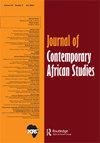Wrecking: the moral economies of cargo salvage on the Northern Corridor
IF 0.8
Q2 AREA STUDIES
引用次数: 0
Abstract
ABSTRACTAlong East Africa’s most trafficked commodity corridor, road accidents sometimes make cargo available for salvaging. This paper draws on genealogies of shipwreck salvage – ‘wrecking’ – to explore how roadside salvagers distinguish their activities from theft and make them legitimate. In contrast with classic theories of property which ask how unowned things become property, I ask the opposite: how do owned things become unowned – available to claim? Central to the legitimacy of salvage, I argue, is the idea of contingency: it was an unexpected event that made goods available for taking. But contingency is approached in contradictory ways by different salvagers: crash cargo can be interpreted as an accidental ‘find,’ to be freely taken, or conversely as a ‘risky opportunity’ from which savvy entrepreneurs can profit.KEYWORDS: Salvageaccidentriskmoral economyproperty Disclosure statementNo potential conflict of interest was reported by the author.Notes1 “First Lady Attacks Saitoti Over Tanker Tragedy.” NTV Report. https://www.youtube.com/watch?v=k3XKoHG1krw2 See for instance the K24 news report, “Survivors of Sachangwan Tragedy.” Accessed at https://www.youtube.com/watch?v=6YHW2QOP5f43 Thompson points out that even historians who were sympathetic to the rioters tended to understand them as driven by material need into a kind of outburst, rather than as people engaging in socially patterned, legitimate action (Citation1971, 78).4 Ethnicized conflict led to an increased segregation of groups in the Rift Valley, and local Kalenjin-identifying groups desired a trading centre of ‘their own.’ A local politician persuaded the county council to purchase and subdivide land for this purpose.5 Others described the lengths they would go to avoid being blamed for a loss – for instance, arranging severe beatings that could persuade investigators they had not colluded in a theft. In this way, companies’ ‘risk management’ techniques sometimes led to hazardous, and even cruel, outcomes.6 According to the Transported Asset Protection Association, which releases regular global reports on cargo loss, €1,282,465 worth of cargo was lost to ‘theft’ in Kenya in 2020. See http://ace-cargadores.com/wp-content/uploads/2021/04/Boletin_1075/TAPA-EMEA-Incident-Information-Service-IIS-Cargo-Theft-Annual-Report.pdf7 Arguing that the goods were ‘flotsam,’ floating wreckage that still belonged to the ship, rather than ‘jetsam,’ intentionally jettisoned goods that are subject to finders’ claims, British companies argued that wrecks were not gifts or accidents but things that still belonged to them.8 This suggests that what Dua presents as a tension between land and sea might also be fruitfully considered in terms of the tension between movable and immovable property.9 That is, the dead person’s family might need that money to pay off their debts. This insightful observation aligns with contemporary debates around the nature of money and debt, where the transferability of debt is often a key question.10 Thank you to an anonymous reviewer for drawing my attention to this piece.11 Anthropologists have often studied private property by considering the logics with which it is in tension. With reference to Kenya, the growing marketisation of land has given rise to valuable scholarship on the way land titling disrupts other attachments to and through land (Shipton Citation2009) but anthropologists have focused less on the concerted effort to attached people to private property in Kenyan society at all levels. Here I view private property as an unspoken dominant formation – full of holes, but nevertheless hegemonic in that other ideas of owning and taking are defined in relation to it.12 See, for example, “Residents of Roysambu in a Frenzy after Beer Truck Overturns.” Nation, October 5, 2019. https://www.youtube.com/watch?v=Ae_jEhrhunI13 Compare to Joshua Reno’s concept of the ‘individuation’ of scavenged goods in a dump site. On the Northern Corridor, the goods are de-alienated but not individuated.14 These are extremely valuable byproducts of the fishing industry on Lake Victoria. Also known as ‘swim bladders,’ they are used to make surgical thread and anaesthetics.15 For instance, when Barack Obama spoke at the Global Entrepreneurship Summit in Nairobi in 2016, unwaged motorcycle workers lamented that they had not been invited to participate, even though they too were ‘entrepreneurs.’沉船:北方走廊货物打捞的道德经济
作为东非交通最繁忙的商品通道,道路事故有时会使货物被打捞。本文借鉴了沉船打捞的谱系——“沉船”——来探讨路边打捞者如何区分他们的活动与盗窃,并使其合法化。经典的财产理论问的是无主的东西是如何成为财产的,与之相反,我问的是相反的问题:拥有的东西是如何成为无主的——可以索取的?我认为,打捞合法性的核心是偶然性的概念:它是一种意外事件,使货物可供获取。但不同的打捞者对偶然性的理解是矛盾的:失事货物可以被解释为偶然的“发现”,可以随意拿走,也可以反过来解释为精明的企业家可以从中获利的“冒险机会”。关键词:救助事故风险道德经济财产披露声明作者未发现潜在利益冲突。注1“第一夫人因油轮悲剧袭击齐藤提。”NTV报告。https://www.youtube.com/watch?v=k3XKoHG1krw2请看K24的新闻报道,“沙场湾悲剧的幸存者”。访问https://www.youtube.com/watch?v=6YHW2QOP5f43汤普森指出,即使是同情暴乱者的历史学家也倾向于把他们理解为物质需求驱使的一种爆发,而不是人们参与社会模式的合法行动(Citation1971, 78)种族冲突导致东非大裂谷的族群隔离加剧,当地认同卡伦津人的族群希望有一个属于自己的贸易中心。一位当地政治家说服县议会为此目的购买并细分土地另一些人则描述了他们为了避免因损失而被指责所做的努力——例如,安排严厉的殴打,以说服调查人员他们没有串谋盗窃。在这种情况下,公司的“风险管理”技术有时会导致危险的,甚至残酷的结果根据定期发布全球货物损失报告的运输资产保护协会的数据,2020年肯尼亚因“盗窃”而损失了价值1,282,465欧元的货物。英国公司认为,这些货物是“漂浮物”(flotsam),即仍然属于船只的漂浮残骸,而不是“弃置物”(jetsam),即故意丢弃的货物,归发现者所有。英国公司辩称,这些残骸既不是礼物,也不是意外事故,而是仍然属于他们的东西这表明,Dua所呈现的陆地和海洋之间的紧张关系也可以有效地考虑动产和不动产之间的紧张关系也就是说,死者的家人可能需要这笔钱来偿还债务。这一富有洞察力的观察与当代围绕货币和债务本质的辩论一致,债务的可转移性往往是一个关键问题感谢一位匿名评论者让我注意到这篇文章人类学家在研究私有财产时,常常考虑到与之相矛盾的逻辑。以肯尼亚为例,不断增长的土地市场化已经产生了关于土地所有权如何破坏其他对土地的依恋和通过土地的依恋的有价值的学术研究(Shipton Citation2009),但人类学家对肯尼亚社会各级将人们与私有财产联系起来的协同努力关注较少。在这里,我把私有财产看作是一种不言而喻的支配形态——充满了漏洞,但仍然是霸权的,因为其他关于拥有和占有的观念都是与它相关的例如,“啤酒卡车倾覆后,罗伊桑布居民的疯狂”。国家,2019年10月5日。https://www.youtube.com/watch?v=Ae_jEhrhunI13与约书亚·雷诺的“个性化”垃圾场拾取物品的概念相比。在北方走廊上,商品是去异化的,但不是个性化的这些都是维多利亚湖渔业的极有价值的副产品。它们也被称为“鱼鳔”,用于制作手术线和麻醉剂例如,2016年巴拉克•奥巴马(Barack Obama)在内罗毕举行的全球创业峰会(Global Entrepreneurship Summit)上发表讲话时,没有领工资的摩托车工人哀叹自己没有被邀请参加,尽管他们也是“企业家”。
本文章由计算机程序翻译,如有差异,请以英文原文为准。
求助全文
约1分钟内获得全文
求助全文
来源期刊

Journal of Contemporary African Studies
AREA STUDIES-
CiteScore
2.20
自引率
0.00%
发文量
18
期刊介绍:
Journal of Contemporary African Studies (JCAS) is an interdisciplinary journal seeking to promote an African-centred scholarly understanding of societies on the continent and their location within the global political economy. Its scope extends across a wide range of social science and humanities disciplines with topics covered including, but not limited to, culture, development, education, environmental questions, gender, government, labour, land, leadership, political economy politics, social movements, sociology of knowledge and welfare. JCAS welcomes contributions reviewing general trends in the academic literature with a specific focus on debates and developments in Africa as part of a broader aim of contributing towards the development of viable communities of African scholarship. The journal publishes original research articles, book reviews, notes from the field, debates, research reports and occasional review essays. It also publishes special issues and welcomes proposals for new topics. JCAS is published four times a year, in January, April, July and October.
 求助内容:
求助内容: 应助结果提醒方式:
应助结果提醒方式:


